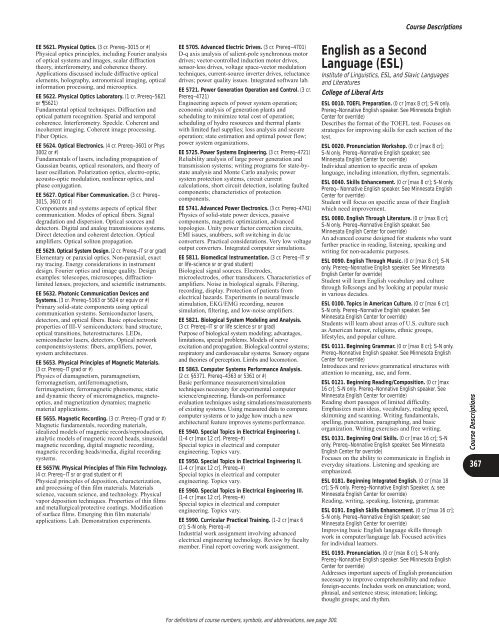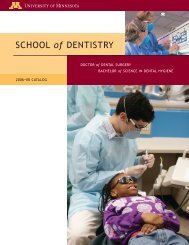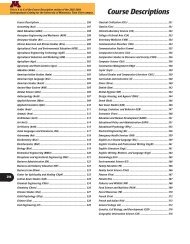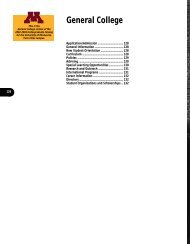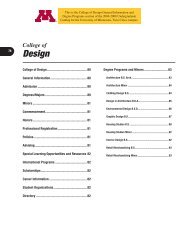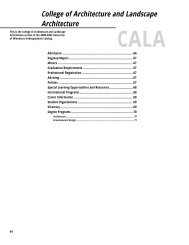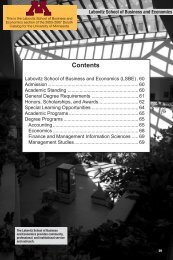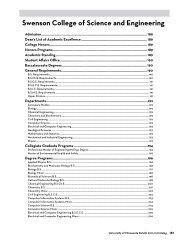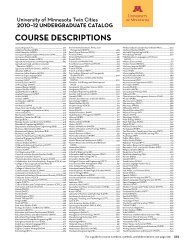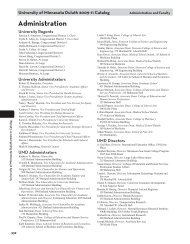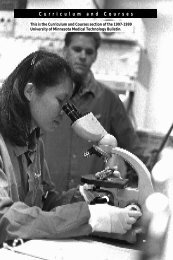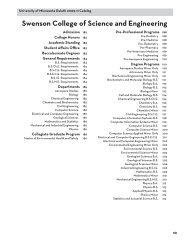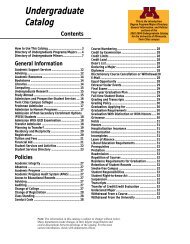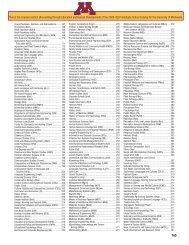CoursesâCSCI through FSCN - University Catalogs - University of ...
CoursesâCSCI through FSCN - University Catalogs - University of ...
CoursesâCSCI through FSCN - University Catalogs - University of ...
You also want an ePaper? Increase the reach of your titles
YUMPU automatically turns print PDFs into web optimized ePapers that Google loves.
Course DescriptionsEE 5621. Physical Optics. (3 cr. Prereq–3015 or #)Physical optics principles, including Fourier analysis<strong>of</strong> optical systems and images, scalar diffractiontheory, interferometry, and coherence theory.Applications discussed include diffractive opticalelements, holography, astronomical imaging, opticalinformation processing, and microoptics.EE 5622. Physical Optics Laboratory. (1 cr. Prereq–5621or 5621)Fundamental optical techniques. Diffraction andoptical pattern recognition. Spatial and temporalcoherence. Interferometry. Speckle. Coherent andincoherent imaging. Coherent image processing.Fiber Optics.EE 5624. Optical Electronics. (4 cr. Prereq–3601 or Phys3002 or #)Fundamentals <strong>of</strong> lasers, including propagation <strong>of</strong>Gaussian beams, optical resonators, and theory <strong>of</strong>laser oscillation. Polarization optics, electro-optic,acousto-optic modulation, nonlinear optics, andphase conjugation.EE 5627. Optical Fiber Communication. (3 cr. Prereq–3015, 3601 or #)Components and systems aspects <strong>of</strong> optical fibercommunication. Modes <strong>of</strong> optical fibers. Signaldegradation and dispersion. Optical sources anddetectors. Digital and analog transmissions systems.Direct detection and coherent detection. Opticalamplifiers. Optical soliton propagation.EE 5629. Optical System Design. (2 cr. Prereq–IT sr or grad)Elementary or paraxial optics. Non-paraxial, exactray tracing. Energy considerations in instrumentdesign. Fourier optics and image quality. Designexamples: telescopes, microscopes, diffractionlimitedlenses, projectors, and scientific instruments.EE 5632. Photonic Communication Devices andSystems. (3 cr. Prereq–5163 or 5624 or equiv or #)Primary solid-state components using opticalcommunication systems. Semiconductor lasers,detectors, and optical fibers. Basic optoelectronicproperties <strong>of</strong> III-V semiconductors: band structure,optical transitions, heterostructures. LEDs,semiconductor lasers, detectors. Optical networkcomponents/systems: fibers, amplifiers, power,system architectures.EE 5653. Physical Principles <strong>of</strong> Magnetic Materials.(3 cr. Prereq–IT grad or #)Physics <strong>of</strong> diamagnetism, paramagnetism,ferromagnetism, antiferromagnetism,ferrimagnetism; ferromagnetic phenomena; staticand dynamic theory <strong>of</strong> micromagnetics, magnetooptics,and magnetization dynamics; magneticmaterial applications.EE 5655. Magnetic Recording. (3 cr. Prereq–IT grad or #)Magnetic fundamentals, recording materials,idealized models <strong>of</strong> magnetic records/reproduction,analytic models <strong>of</strong> magnetic record heads, sinusoidalmagnetic recording, digital magnetic recording,magnetic recording heads/media, digital recordingsystems.EE 5657W. Physical Principles <strong>of</strong> Thin Film Technology.(4 cr. Prereq–IT sr or grad student or #)Physical principles <strong>of</strong> deposition, characterization,and processing <strong>of</strong> thin film materials. Materialsscience, vacuum science, and technology. Physicalvapor deposition techniques. Properties <strong>of</strong> thin filmsand metallurgical/protective coatings. Modification<strong>of</strong> surface films. Emerging thin film materials/applications. Lab. Demonstration experiments.EE 5705. Advanced Electric Drives. (3 cr. Prereq–4701)D-q axis analysis <strong>of</strong> salient-pole synchronous motordrives; vector-controlled induction motor drives,sensor-less drives, voltage space-vector modulationtechniques, current-source inverter drives, reluctancedrives; power quality issues. Integrated s<strong>of</strong>tware lab.EE 5721. Power Generation Operation and Control. (3 cr.Prereq–4721)Engineering aspects <strong>of</strong> power system operation;economic analysis <strong>of</strong> generation plants andscheduling to minimize total cost <strong>of</strong> operation;scheduling <strong>of</strong> hydro resources and thermal plantswith limited fuel supplies; loss analysis and secureoperation; state estimation and optimal power flow;power system organizations.EE 5725. Power Systems Engineering. (3 cr. Prereq–4721)Reliability analysis <strong>of</strong> large power generation andtransmission systems; writing programs for state-bystateanalysis and Monte Carlo analysis; powersystem protection systems, circuit currentcalculations, short circuit detection, isolating faultedcomponents; characteristics <strong>of</strong> protectioncomponents.EE 5741. Advanced Power Electronics. (3 cr. Prereq–4741)Physics <strong>of</strong> solid-state power devices, passivecomponents, magnetic optimization, advancedtopologies. Unity power factor correction circuits,EMI issues, snubbers, s<strong>of</strong>t switching in dc/acconverters. Practical considerations. Very low voltageoutput converters. Integrated computer simulations.EE 5811. Biomedical Instrumentation. (3 cr. Prereq–IT sror life-science sr or grad student)Biological signal sources. Electrodes,microelectrodes, other transducers. Characteristics <strong>of</strong>amplifiers. Noise in biological signals. Filtering,recording, display. Protection <strong>of</strong> patients fromelectrical hazards. Experiments in neural/musclestimulation, EKG/EMG recording, neuronsimulation, filtering, and low-noise amplifiers.EE 5821. Biological System Modeling and Analysis.(3 cr. Prereq–IT sr or life science sr or grad)Purpose <strong>of</strong> biological system modeling; advantages,limitations, special problems. Models <strong>of</strong> nerveexcitation and propagation. Biological control systems;respiratory and cardiovascular systems. Sensory organsand theories <strong>of</strong> perception. Limbs and locomotion.EE 5863. Computer Systems Performance Analysis.(2 cr. §5371. Prereq–4363 or 5361 or #)Basic performance measurement/simulationtechniques necessary for experimental computerscience/engineering. Hands-on performanceevaluation techniques using simulations/measurements<strong>of</strong> existing systems. Using measured data to comparecomputer systems or to judge how much a newarchitectural feature improves systems performance.EE 5940. Special Topics in Electrical Engineering I.(1-4 cr [max 12 cr]. Prereq–#)Special topics in electrical and computerengineering. Topics vary.EE 5950. Special Topics in Electrical Engineering II.(1-4 cr [max 12 cr]. Prereq–#)Special topics in electrical and computerengineering. Topics vary.EE 5960. Special Topics in Electrical Engineering III.(1-4 cr [max 12 cr]. Prereq–#)Special topics in electrical and computerengineering. Topics vary.EE 5990. Curricular Practical Training. (1-2 cr [max 6cr]; S-N only. Prereq–#)Industrial work assignment involving advancedelectrical engineering technology. Review by facultymember. Final report covering work assignment.English as a SecondLanguage (ESL)Institute <strong>of</strong> Linguistics, ESL, and Slavic Languagesand LiteraturesCollege <strong>of</strong> Liberal ArtsESL 0010. TOEFL Preparation. (0 cr [max 8 cr]; S-N only.Prereq–Nonnative English speaker. See Minnesota EnglishCenter for override)Describes the format <strong>of</strong> the TOEFL test. Focuses onstrategies for improving skills for each section <strong>of</strong> thetest.ESL 0020. Pronunciation Workshop. (0 cr [max 8 cr];S-N only. Prereq–Nonnative English speaker; seeMinnesota English Center for override)Individual attention to specific areas <strong>of</strong> spokenlanguage, including intonation, rhythm, segmentals.ESL 0040. Skills Enhancement. (0 cr [max 8 cr]; S-N only.Prereq– Nonnative English speaker. See Minnesota EnglishCenter for override)Student will focus on specific areas <strong>of</strong> their Englishwhich need improvement.ESL 0080. English Through Literature. (0 cr [max 8 cr];S-N only. Prereq–Nonnative English speaker. SeeMinnesota English Center for override)An advanced course designed for students who wantfurther practice in reading, listening, speaking andwriting for non-academic purposes.ESL 0090. English Through Music. (0 cr [max 8 cr]; S-Nonly. Prereq–Nonnative English speaker. See MinnesotaEnglish Center for override)Student will learn English vocabulary and culture<strong>through</strong> folksongs and by looking at popular musicin various decades.ESL 0100. Topics in American Culture. (0 cr [max 6 cr];S-N only. Prereq–Nonnative English speaker. SeeMinnesota English Center for override)Students will learn about areas <strong>of</strong> U.S. culture suchas American humor, religions, ethnic groups,lifestyles, and popular culture.ESL 0111. Beginning Grammar. (0 cr [max 8 cr]; S-N only.Prereq–Nonnative English speaker. See Minnesota EnglishCenter for override)Introduces and reviews grammatical structures withattention to meaning, use, and form.ESL 0121. Beginning Reading/Composition. (0 cr [max16 cr]; S-N only. Prereq–Nonnative English speaker. SeeMinnesota English Center for override)Reading short passages <strong>of</strong> limited difficulty.Emphasizes main ideas, vocabulary, reading speed,skimming and scanning. Writing fundamentals,spelling, punctuation, paragraphing, and basicorganization. Writing exercises and free writing.ESL 0131. Beginning Oral Skills. (0 cr [max 16 cr]; S-Nonly. Prereq–Nonnative English speaker. See MinnesotaEnglish Center for override)Focuses on the ability to communicate in English ineveryday situations. Listening and speaking areemphasized.ESL 0181. Beginning Integrated English. (0 cr [max 18cr]; S-N only. Prereq–Nonnative English Speaker, ∆; seeMinnesota English Center for override)Reading, writing, speaking, listening, grammar.ESL 0191. English Skills Enhancement. (0 cr [max 16 cr];S-N only. Prereq–Nonnative English speaker; seeMinnesota English Center for override)Improving basic English language skills <strong>through</strong>work in computer/language lab. Focused activitiesfor individual learners.ESL 0193. Pronunciation. (0 cr [max 8 cr]; S-N only.Prereq–Nonnative English speaker. See Minnesota EnglishCenter for override)Addresses important aspects <strong>of</strong> English pronunciationnecessary to improve comprehensibility and reduceforeign-accents. Includes work on enunciation; word,phrasal, and sentence stress; intonation; linking;thought groups; and rhythm.Course Descriptions367For definitions <strong>of</strong> course numbers, symbols, and abbreviations, see page 300.


